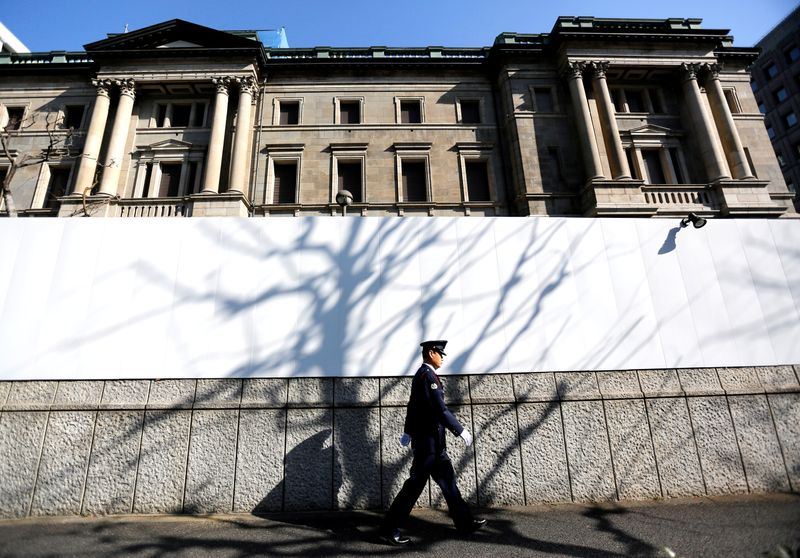By Leika Kihara and Daniel Leussink
TOKYO (Reuters) - The Bank of Japan kept monetary settings steady on Thursday and maintained its upbeat view on the economy, suggesting policymakers are in no hurry to boost stimulus even as global risks threaten a fragile recovery.
But the central bank offered a gloomier view on factory output than at its previous rate review in October, a nod to the widening fallout from softening global demand and the U.S.-China trade war.
The decision to stand pat keeps Japan in line with the U.S. Federal Reserve and the European Central Bank, which have both signalled their respective monetary policies will be in a holding pattern for the time being.
"The BOJ will likely stand pat throughout next year given the Fed probably won't raise or cut interest rates, which should keep yen moves steady," said Izuru Kato, chief economist at Totan Research.
"For the time being, the BOJ will keep its fingers on the trigger to signal its readiness to ease. But it won't actually pull the trigger."
As widely expected, the BOJ maintained its short-term interest rate target at -0.1% and that for 10-year government bond yields around 0%.
The central bank also kept intact its assessment that Japan's economy continues to expand moderately as a trend.
"Industrial production is falling due mainly to natural disasters," the BOJ said in a statement announcing its policy decision, revising down its view from October when it said output was moving sideways.
The steady policy stance is partly underpinned by moves from the United States and China to secure a preliminary trade deal to de-escalate a bruising trade war, which has hit world growth.
"The main recognition is that exports and production are weak. As a result of the sales tax hike (in October), the domestic market is worsening. But the BOJ views that as a temporary matter, so it is postponing its judgement," said Taro Saito, executive research fellow at NLI Research Institute.
RESTORING LIQUIDITY
At his post-meeting news conference, BOJ Governor Haruhiko Kuroda is likely to repeat the bank's readiness to ease further if global risks threaten to derail Japan's economic recovery.
But many analysts say the hurdle for action is high given the strain prolonged ultra-low rates is heaping on financial institutions.
As part of efforts to ease the side-effects of its huge asset buying, the BOJ unveiled details of a scheme first flagged in April to lend some of its holdings of exchange-traded funds (ETF).
Aside from gobbling up government bonds to keep bond yields low, the BOJ also buys ETFs and other risky assets as part of its massive stimulus programme. Some investors have complained that the BOJ's huge buying was crowding out private traders and draining liquidity in the ETF market.
Koichi Hamada, a key economic adviser to Prime Minister Shinzo Abe, also criticised the BOJ's negative rate policy and warned against pushing borrowing costs down to a "reversal rate," or a level that could do more harm than good by crippling financial institutions' ability to lend.
"Negative interest rates hurt, particularly smaller financial institutions' health, so the BOJ must try to avoid a situation where interest rates reach a level deemed as a reversal rate," he told Reuters earlier this week.
Japan's economy, the world's third-largest, expanded an annualised 1.8% in the third quarter on resilient domestic demand and business spending.
But factory output suffered its largest fall in two years in October and big manufacturers' business sentiment sank to a near seven-year low in the fourth quarter, underscoring the fragile state of Japan's recovery.

Many analysts expect the economy to have contracted in the current quarter as a sales tax hike in October cools consumption.